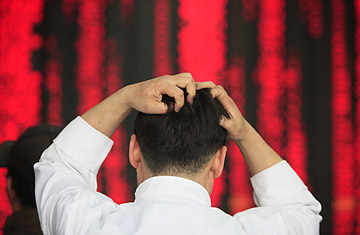
An investor reacts as he looks at the stock price monitor
Investor wisdom says that when tough times hit it's far better to be in developed stock markets like America's than in emerging markets. But is that still true?
The S&P 500 index, a popular proxy for American stocks, is down 47% from its peak, while Hong Kong's Hang Seng index is down 51%. But America is waist deep in a financial crisis with no clear end in sight, and is taking on trillion dollar deficits that it can ill afford, while China is sitting atop a mountain of foreign exchange reserves and should enjoy 6.5% growth in 2009, according to the World Bank. That doesn't dismiss China's economic headwinds — its exports were down a stunning 25% in February — but points up an important contrast. (See pictures of the global financial crisis.)
Professional investors are taking note. In a newly released survey of 213 investment fund managers, conducted in mid-March, only 1% of respondents expected China's economy to worsen over the next 12 months. Just two months ago, 70% of respondents were negative on China's 12-month prospects. The global survey, performed by Bank America Securities-Merrill Lynch (now, that's a mouthful) also notes that optimism on China is prompting more investment into emerging markets.
One survey does not put financial markets on a new course. But it does suggest that there may be a changing of the guard, where emerging markets suffer a less vicious swipe from the bear, while the developed markets (and overly leveraged economies) of Europe and the U.S. confront something more grizzly. In the survey, America still comes up as a popular stock market, but not because of bullish prospects. "It's really seen as a safe haven in troubled times," says Michael Hartnett, co-head of international investing strategy at the Wall Street firm. That's not the kind of optimistic perception that powers a sustained bull run.
The past bear markets of both the U.S. and China's Hang Seng index, charted at the bottom of this article, show that China's index has historically had more severe and frequent downturns. In the post-war period, the Hang Seng's bear markets averaged a drop of 55.8% peak-to-trough, while the U.S. bear markets averaged only a 44% drop. "We're more used to seeing our [current]degree of pain in emerging markets," notes Hartnett. The current U.S. bear market was down more than 53% before clawing back a bit in mid-March.
This time around Western financial institutions are in crisis, but most emerging market banks are not. "They don't have all these toxic assets to contend with," says Hartnett. He notes that Asian bank stocks are now at an all time high relative to European and American banks. That's one reason the Hang Seng index has not gone below its Novembers lows, while U.S. stocks recently sliced through their November lows like a knife through butter. Shifts in investor sentiment — and economic fortune — can reverse or be upended by events. But stock market behavior, economic fundamentals and changing investor ideas about future performance make for interesting tea leaves in this uncertain times. And by the looks of it, China stands to benefit. (See TIME's pictures of the week.)


